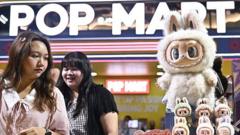The toy sensation Labubu, created by the Chinese company Pop Mart, is projected to drastically increase its profits by a staggering 350% in the first half of this year. The Beijing-based firm, valued at over $40 billion, credits its profitability to enhanced international brand recognition and diligent cost controls.
Labubu dolls, whimsical elf-like characters characterized by their distinct jagged teeth, have captivated collectors worldwide, resulting in substantial sales. The popularity of these toys has led to extended queues at stores globally, demonstrating a notable shift in consumer interest near the end of 2024.
Pop Mart is recognized for its innovative "blind box" selling strategy, where items are concealed inside packaging until opened. Though this method faces scrutiny for its similarity to gambling, the allure of surprise has proven effective. Since their debut in 2019, Labubu dolls have propelled Pop Mart into a prominent retail position, boasting over 2,000 vending machines and storefronts across the globe.
Since its public listing in 2020 on the Hong Kong Stock Exchange, Pop Mart's market valuation has remarkably surged nearly 600% in just a year. International sales now constitute about 40% of the company's revenue, a significant turn as demand for Labubu dolls reaches unprecedented levels, especially in the US, where sales increased by an astounding 5,000% from the previous year, as reported by equity research firm M Science.
Celebrity endorsements from figures like Kim Kardashian and Lisa of Blackpink have further skyrocketed the popularity of Labubu in the United States, adding to the brand's meteoric rise. Collaborations with giants such as Coca-Cola and the manga franchise One Piece have also played a crucial role in expanding Labubu's visibility.
With only around 40 stores in the US compared to approximately 400 in China, the American market holds immense potential for further growth. This unprecedented demand has not only enriched Pop Mart, but has also incited a thriving resale market, where the original $10 dolls can now command prices reaching hundreds of dollars, including a record-breaking human-sized Labubu that sold for $150,000 at auction in Beijing last month.
However, such immense popularity has led to a spike in counterfeit products, termed Lafufu dolls, prompting Chinese authorities to seize over 46,000 fake items in a crackdown on the burgeoning black market. With both excitement and controversy surrounding Labubu's ascent, the toy is shaping new trends in both collecting and marketing in the toy industry.


















